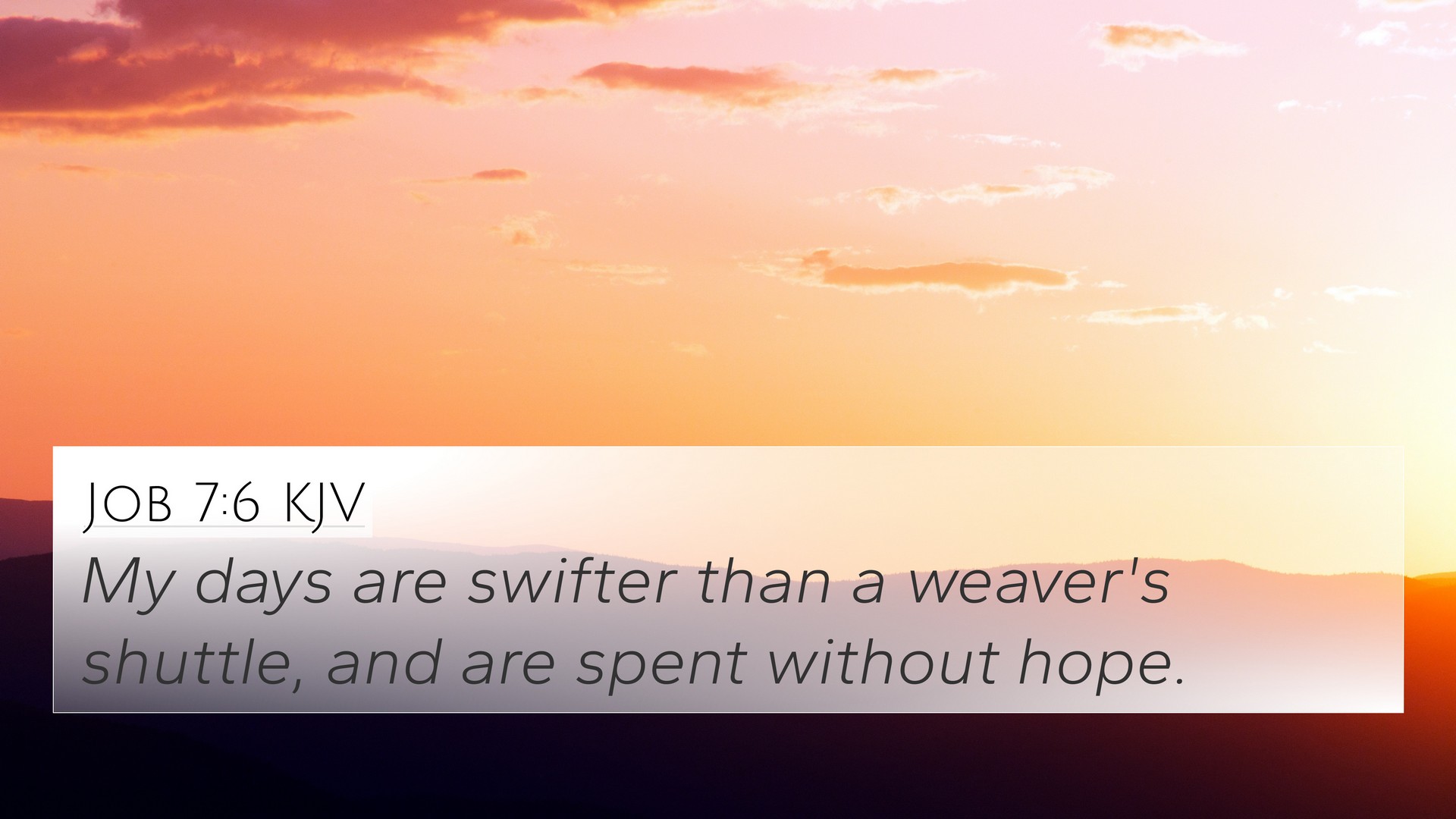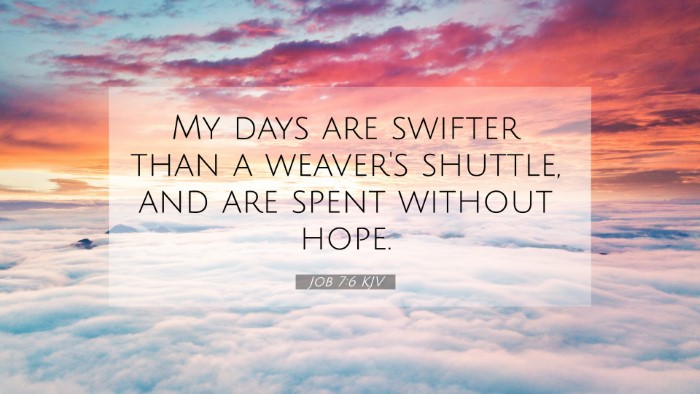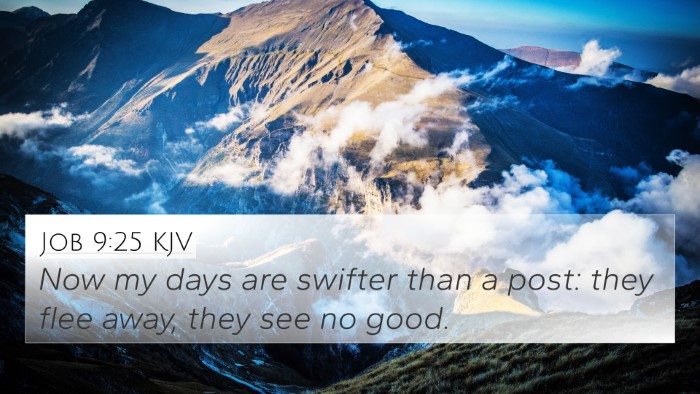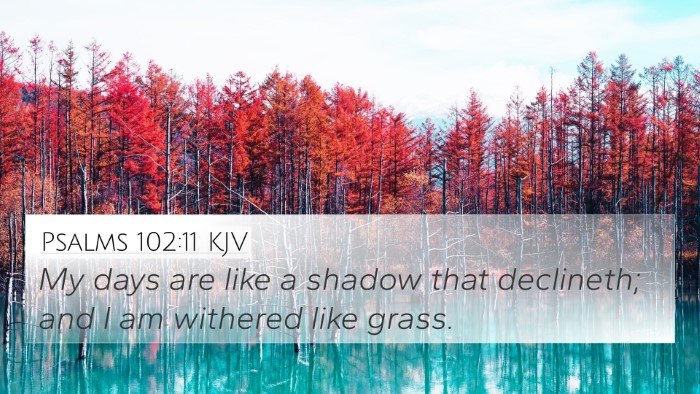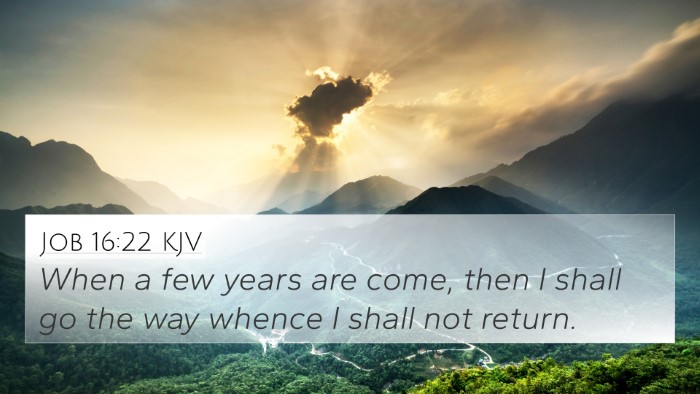Old Testament
Genesis Exodus Leviticus Numbers Deuteronomy Joshua Judges Ruth 1 Samuel 2 Samuel 1 Kings 2 Kings 1 Chronicles 2 Chronicles Ezra Nehemiah Esther Job Psalms Proverbs Ecclesiastes Song of Solomon Isaiah Jeremiah Lamentations Ezekiel Daniel Hosea Joel Amos Obadiah Jonah Micah Nahum Habakkuk Zephaniah Haggai Zechariah MalachiJob 7:6 Similar Verses
Job 7:6 Cross References
My days are swifter than a weaver's shuttle, and are spent without hope.
Uncover the Rich Themes and Topics of This Bible Verse
Listed below are the Bible themes associated with Job 7:6. We invite you to explore each theme to gain deeper insights into the Scriptures.
Job 7:6 Cross Reference Verses
This section features a detailed cross-reference designed to enrich your understanding of the Scriptures. Below, you will find carefully selected verses that echo the themes and teachings related to Job 7:6 KJV. Click on any image to explore detailed analyses of related Bible verses and uncover deeper theological insights.
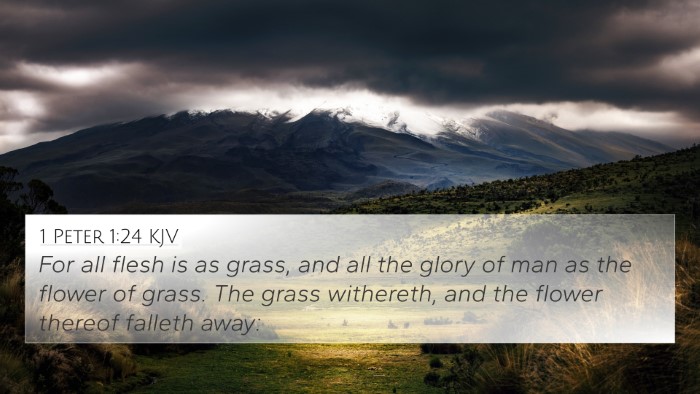
1 Peter 1:24 (KJV) »
For all flesh is as grass, and all the glory of man as the flower of grass. The grass withereth, and the flower thereof falleth away:
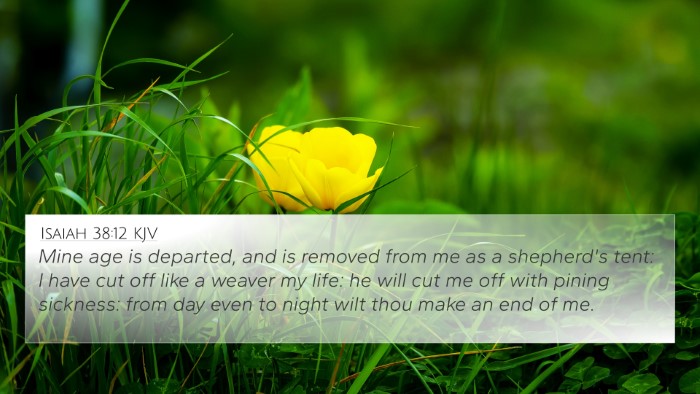
Isaiah 38:12 (KJV) »
Mine age is departed, and is removed from me as a shepherd's tent: I have cut off like a weaver my life: he will cut me off with pining sickness: from day even to night wilt thou make an end of me.
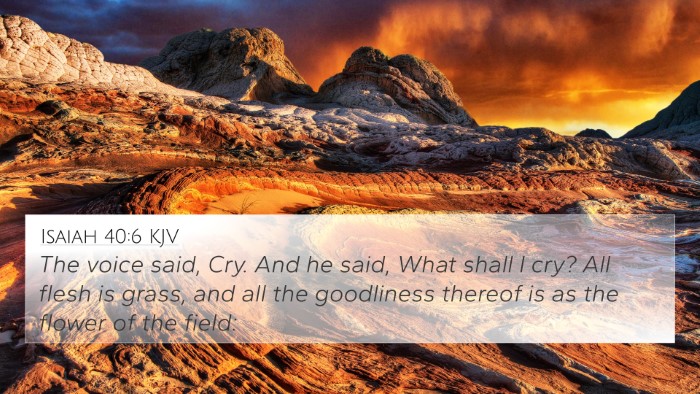
Isaiah 40:6 (KJV) »
The voice said, Cry. And he said, What shall I cry? All flesh is grass, and all the goodliness thereof is as the flower of the field:

Proverbs 14:32 (KJV) »
The wicked is driven away in his wickedness: but the righteous hath hope in his death.
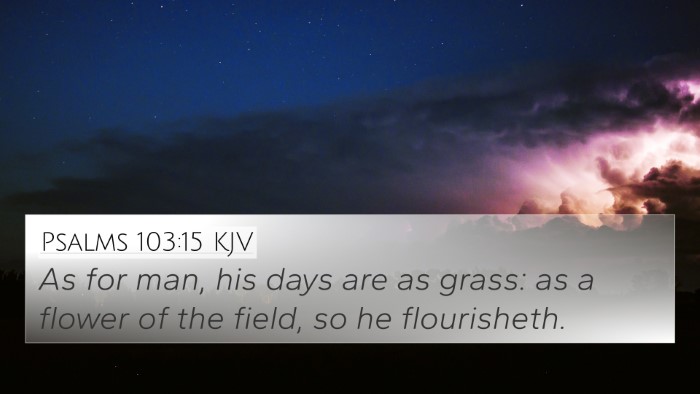
Psalms 103:15 (KJV) »
As for man, his days are as grass: as a flower of the field, so he flourisheth.
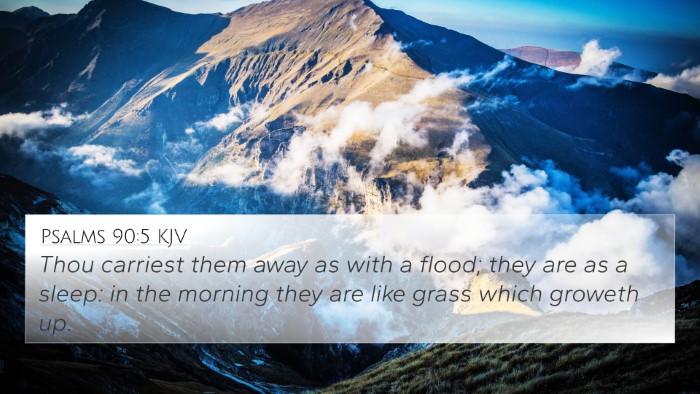
Psalms 90:5 (KJV) »
Thou carriest them away as with a flood; they are as a sleep: in the morning they are like grass which groweth up.

Job 6:11 (KJV) »
What is my strength, that I should hope? and what is mine end, that I should prolong my life?

Job 13:15 (KJV) »
Though he slay me, yet will I trust in him: but I will maintain mine own ways before him.
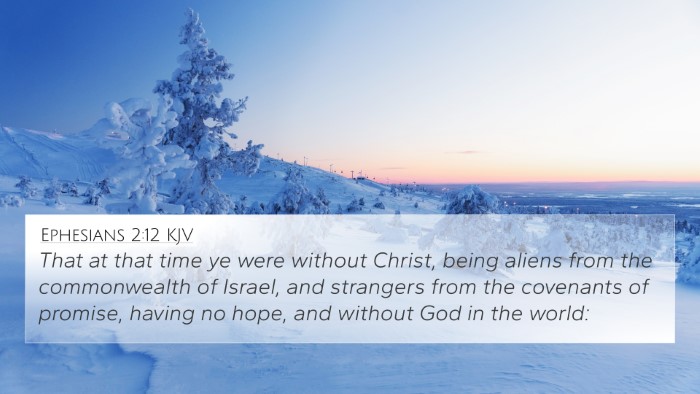
Ephesians 2:12 (KJV) »
That at that time ye were without Christ, being aliens from the commonwealth of Israel, and strangers from the covenants of promise, having no hope, and without God in the world:
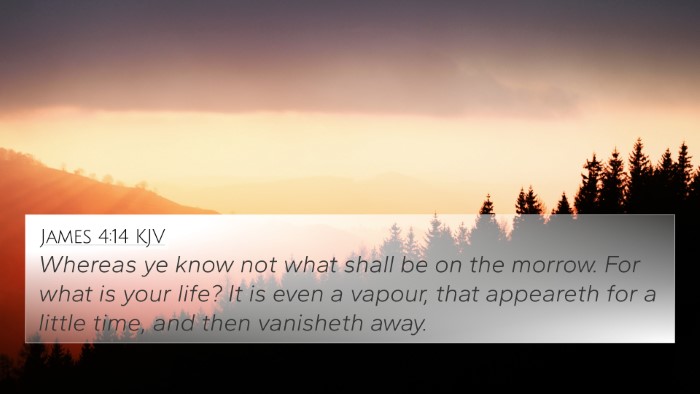
James 4:14 (KJV) »
Whereas ye know not what shall be on the morrow. For what is your life? It is even a vapour, that appeareth for a little time, and then vanisheth away.

James 1:11 (KJV) »
For the sun is no sooner risen with a burning heat, but it withereth the grass, and the flower thereof falleth, and the grace of the fashion of it perisheth: so also shall the rich man fade away in his ways.
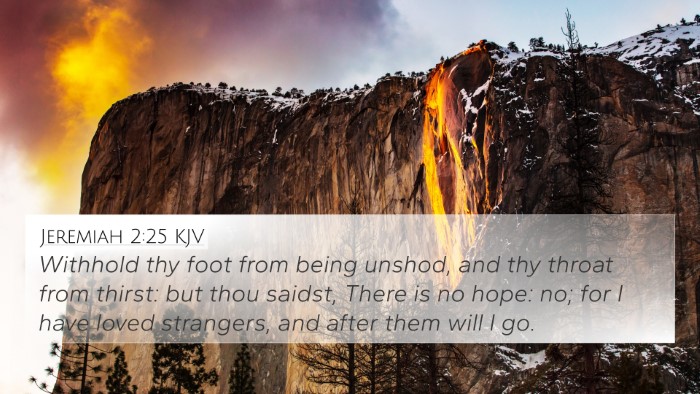
Jeremiah 2:25 (KJV) »
Withhold thy foot from being unshod, and thy throat from thirst: but thou saidst, There is no hope: no; for I have loved strangers, and after them will I go.

1 Peter 1:13 (KJV) »
Wherefore gird up the loins of your mind, be sober, and hope to the end for the grace that is to be brought unto you at the revelation of Jesus Christ;
Job 7:6 Verse Analysis and Similar Verses
Understanding Job 7:6
Job 7:6 states, "My days are swifter than a weaver's shuttle, and are spent without hope." This verse is a poignant reflection of Job's deep anguish and the fleeting nature of his life amid suffering. Below, we explore insights from prominent public domain commentaries, including those by Matthew Henry, Albert Barnes, and Adam Clarke, to gain a well-rounded understanding of its meaning.
Thematic Insights
Job expresses a sentiment of despair and hopelessness regarding his existence. The imagery of a weaver's shuttle represents the rapid passage of time, emphasizing how quickly life can pass by, often without fulfillment or joy.
Commentary Insights
- Matthew Henry: Henry remarks that Job's sorrow leads him to a contemplative state where he recognizes life's brevity and the impermanence of his suffering. He indicates that such expressions of suffering can bring both despair and a desire for deeper understanding of one’s existence.
- Albert Barnes: Barnes interprets this verse as a clear reflection of Job's understanding that life is transient. The weaver's shuttle, moving swiftly back and forth, serves to convey the idea that life can seem to be over almost before it has begun, filled with troubles that overshadow any moments of happiness.
- Adam Clarke: Clarke complements this view by pointing out that Job perceives his days as filled with volatility and uncertainty. His statement captures the essence of human mortality and the existential struggle against the backdrop of suffering.
Bible Verse Cross-References
This verse invites connections with several other biblical texts that resonate with Job's feelings and experiences:
- Psalm 39:5-6: "Behold, you have made my days a few handbreadths, and my lifetime is as nothing before you. Surely all mankind stands as a mere breath!"
- James 4:14: "Yet you do not know what tomorrow will bring. What is your life? For you are a mist that appears for a little time and then vanishes."
- Ecclesiastes 1:2: "Vanity of vanities, says the Preacher, vanity of vanities! All is vanity."
- Isaiah 38:12: "Like a shepherd's tent, my dwelling is plucked up and removed from me; as a weaver I have rolled up my life; he cuts me off from the loom."
- Job 9:25-26: "My days are swifter than a runner; they flee away; they see no good. They go by like skiffs of reed, like an eagle swooping on the prey."
- Psalm 102:11: "My days are like an evening shadow; I wither away like grass."
- Genesis 47:9: "And Jacob said to Pharaoh, 'The days of the years of my sojourning are one hundred and thirty years. Few and evil have been the days of the years of my life...'"
Connections between Bible Verses
Job 7:6 serves as a bridge to understanding various biblical truths regarding the temporal nature of life. The links between the verses can deepen one’s insight into God’s sovereignty amidst human suffering:
- The connections between Job's expressions and Psalms reflect the overarching theme of human despair in the face of life's brevity.
- Comparative studies of Job with other scriptural figures reveal a consistent theme of questioning human suffering and the meaning of existence.
- Thematic connections exist between Job, Ecclesiastes, and the New Testament, where the ephemerality of life is addressed, encouraging believers to find hope and purpose.
Coping with Suffering
Through these insights, it is essential to recognize how Job's lamentation resonates with our own experiences. Many believers often turn to cross-referenced scripture for guidance:
- Tools for Bible Cross-Referencing: Utilizing a Bible concordance can help in identifying similar themes throughout scripture.
- How to Use Bible Cross-References: Approaching the text with a methodical eye allows for enriched understanding, especially when navigating through difficult passages.
- Bible Reference Resources: Engaging in cross-reference Bible studies can provide comfort and clarity, especially during trials.
Conclusion
In summary, Job 7:6 invites a deeper reflection on the transient nature of life, articulating feelings of despair that resonate throughout scripture. By leveraging cross-references, believers can better understand not only the struggles expressed by Job but also the greater narrative of hope and redemption woven throughout the Bible. Encounters with such verses can inspire prayer, meditation, and a renewed focus on what lies beyond our mortal experiences.
